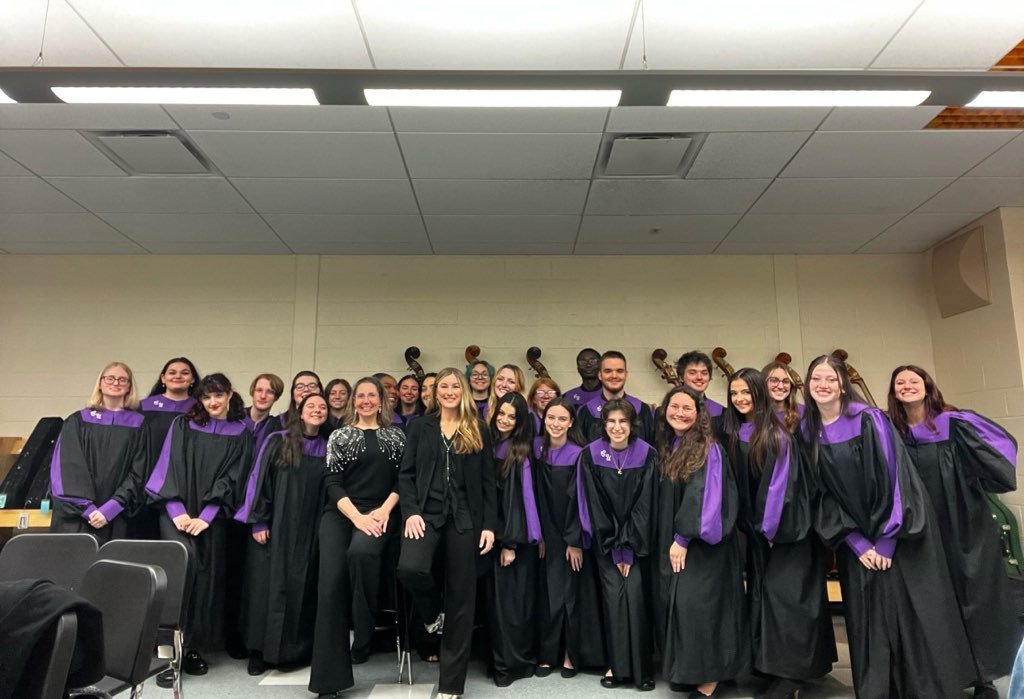How Chatham’s Faculty Connects to the Pittsburgh Music Community
Chatham Choir poses at the 2023 River City Brass Band Concert
Seven-year-old Adam Lee picked up the clarinet to be just like his grandmother.
“My grandmother was one of those stodgy old-school classical musicians who really didn't think that there was any good music except classical music,” Lee says. One day, she brought home a record for Lee, and his perception of music changed forever. The cover featured Benny Goodman, America’s "King of Swing," or, as Lee puts it, “a clean-cut white guy with glasses.”
His grandmother had no idea the record would spark Lee’s lifelong love of jazz.
Adam Lee, now Chatham’s band director, leads the University’s jazz ensemble and concert band. He brings his passion for jazz not only to his role at Chatham, but also to his work in the wider community. At Pittsburgh’s Afro-American Music Institute in Homewood, Lee teaches music to children and adults. Reflecting on Pittsburgh’s music scene, Lee describes it as “contradictorily adventurous, but conservative.”
He elaborates by stating that boundary-pushing musicians with a conservative audience can be resistant to experimentation. Though jazz music can sometimes favor traditional forms, limiting diversity and exposure, his experiences taught him that all music holds value, resonating uniquely with different listeners—a belief he carries into his classroom and beyond.
Walter Morales implements his Pittsburgh experiences in the classroom as well. He’s the coach accompanist for the Ruud scholars, a scholarship for qualified vocalists who plan to major in music while at Chatham. Morales started at Chatham in 2008.
He is well known in the Pittsburgh community as a past conductor at Carnegie Mellon University and music director for the Undercroft Opera. He’s currently conductor for the Edgewood Symphony Orchestra. Though he has deep roots in the Pittsburgh area, Morales is originally from Costa Rica.
As a Pittsburgh resident of 27 years, Morales describes Pittsburgh’s music community as, “eclectic, versatile, and thriving. He goes on to say, “When I go to Costa Rica, people ask me about Pittsburgh. … We have orchestras, we have choruses, we have opera companies. We have jazz, so much jazz.” He describes Pittsburgh as an ideal place for musicians to connect and develop their craft. He emphasizes the intimate yet rich musical environment, where people know each other and form lasting creative partnerships.
Kelly Lynch, an adjunct faculty member in the music program, works with students to develop their vocal technique and their musical understanding. She customizes lessons to her students' needs, sometimes even using physical movements and metaphors to explain vocal technique.
After graduating from Carnegie Mellon, Lynch studied massage therapy. “It gave me a deeper understanding of posture and tension release, which I bring into my teaching," she says. Lynch thought she would have an opera career, but teaching gave her more fulfillment and joy. Lynch describes Pittsburgh’s music community as “small but big.”
“The music scene here is vibrant. It’s small enough that everyone knows someone, but large enough to have a true cultural presence," Lynch states.
Michael Boyd is the coordinator of the music program at Chatham University.
Michael Boyd, professor of music and music program coordinator, described Chatham’s music scene as “vibrant, diverse, and fun.” He teaches a variety of music classes to students majoring in music and the general student population. As program coordinator, Boyd also engages in music research and collaborates with administrators on various tasks.
At Chatham, Boyd works with students and faculty from diverse backgrounds and oversees a variety of programs. He says he hopes to shape the program so everyone can excel based on their personal interests. In his personal time, he composes experimental pieces for musicians with nontraditional notation, such as words and images, creating a collaborative partnership between players rather than making “fixed musical objects.”
Another faculty member who helps programs flourish is Stacey Davern, Chatham’s director of choral activities. A Pittsburgh native, Davern has been with Chatham since 2008, overseeing the Chatham Choir, teaching voice lessons, and serving as an adjunct faculty member. Beyond her work at Chatham, she performs with the Pittsburgh Opera Chorus, sings at Christ United Methodist Church in Bethel Park, and is an active member of the American Choral Directors Association (ACDA) and the American Guild for Musical Artists (AGMA). With her diverse musical training and a strong foundation in choral music, she brings a wealth of experience to her roles as both a performer and educator.
"I love blending the sounds of the choir... fine-tuning everyone's talents and making music together," Davern says.
She describes Pittsburgh’s music community as "small, robust, passionate." It's tightly knit and most musicians know each other. She states that they do it for the love of music, not for monetary gain, highlighting the dedication of local Pittsburgh artists. With genres ranging from jazz to opera, Pittsburgh musicians often collaborate on diverse projects. Drawing from her extensive experience as a performer and educator, she brings expertise from both large-scale performances, like the Pittsburgh Opera, and intimate chamber ensembles to her students. She explains the value of collaboration and a lifelong engagement with music, stating:
"One of my goals... is hoping to find those people who maybe aren’t music majors but can connect with music. You can sing forever; you can make music forever."
Zion Ross ’26 majors in music business with a minor in dance. Passionate about the intersection of performing arts and the entertainment industry, she is particularly interested in blending creative and performing arts with business strategies. Born and raised in Pittsburgh's East End, Zion spends her free time discovering new music and new artists.


